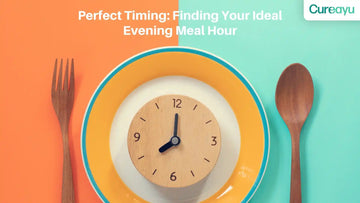The ritual of eating dinner, often a moment of tranquility after the day's hustle, is more consequential to our health than we might believe. In contemporary society, where dinner often shifts to later in the evening to accommodate our busy schedules, realigning mealtime with the body's natural rhythms could unlock numerous health benefits. This comprehensive exploration into the ideal dinner hour uncovers how a simple adjustment in timing can significantly influence our physical and mental well-being, underpinning the old adage that it's not just what we eat but when we eat that matters.
As we delve into the intertwining relationship between dinner time and health, it's essential to understand that our bodies are governed by natural clocks. These biological rhythms influence everything from hormone release to digestion. Disrupting these rhythms, such as eating late, can lead to a myriad of health issues. Hence, choosing the right time for dinner can synergize with our body’s inherent processes, optimizing health, and enhancing life quality.
Also Read: Full Body Cleanse Detox at Home: Revitalize Yourself Naturally and Effectively
What Is the Best Time to Eat Dinner?
Eating dinner between 6 PM to 7 PM is generally considered ideal. This time frame respects the body's circadian rhythm, ensuring meals are digested efficiently and nutritive components are optimally absorbed. Notably, aligning dinner time with the sunset also cues the body for relaxation and prepares it for the upcoming night's rest, aiding in melatonin production and lowering stress levels.
How Appropriate Dinner Time Works for Your Health
Eating earlier in the evening bolsters metabolism, facilitates better digestion, and stabilizes blood sugar levels overnight. It respects the natural dip in metabolism as dusk falls, aiding in nutrient absorption and minimizing the risk of indigestion. Moreover, by avoiding heavy meals close to bedtime, the body can focus on repair and rejuvenation during sleep rather than digestion, fostering a restorative sleep cycle.
Best Time to Eat Dinner for Weight Loss
Timing your dinner earlier can significantly amplify weight loss efforts. This habit potentially extends the nightly fasting period, encouraging the body to tap into stored fat for energy, thus promoting fat loss. Moreover, it diminishes the likelihood of late-night snacking—a common cause of excess caloric intake—thereby supporting a caloric deficit crucial for weight loss. An earlier dinner also synchronizes with the body's highest metabolic rate times, maximizing energy expenditure.
Also Read: The Surprising Dietary Fiber Benefits You Need to Know About
Best Time to Eat Dinner for Acid Reflux
Dining before 6:30 PM is particularly advantageous for individuals struggling with acid reflux. This timing ensures that the stomach has sufficient time to empty before sleeping, dramatically reducing the risk of acid reflux symptoms. It minimizes the backflow of stomach acids into the esophagus, thus preventing discomfort and potential damage to the esophageal lining, and promoting a night of more peaceful, uninterrupted sleep.
Beneficial Dinner Time for Improved Sleep Quality
Consuming your last meal of the day 2 to 3 hours before sleep optimizes sleep quality. This practice aids in preventing sleep disturbances caused by indigestion or the metabolic processes of digestion, which can keep the body awake. It aligns eating patterns with the natural decrease in body temperature and supports the release of melatonin, the sleep hormone, facilitating a smoother transition to sleep.
Also Read: Is Honey Good For Diabetics? Understanding Its Benefits and Risks
Optimizing Digestive Health with Early Dinners
Eating dinner earlier aids in maintaining digestive health by allowing ample time for food breakdown and nutrient absorption before the body enters its rest phase. This timing can drastically reduce instances of bloating, gas, and discomfort, typically associated with late-night meals and lying down post-eating. Early dinners support the maintenance of a healthy gut microbiome, crucial for overall well-being.
Synchronizing Dinner Time with Circadian Rhythm
Aligning dinner time more closely with daylight hours supports the natural circadian rhythm of the body. This synchronization maximizes metabolic efficiency, ensuring calories are used more effectively throughout the remaining daylight hours. It also enhances hormonal balance, promoting better mood and energy levels.
Dinner Timing for Enhanced Mental Health
An often-overlooked benefit of dining earlier is its positive impact on mental health. Eating at a time that aligns with the body's natural rhythms can reduce stress and anxiety levels. It provides the body with necessary nutrients at a time when they can be best used for repairing and regenerating the body and brain, leading to improved cognitive function and emotional well-being.
Also Read: Discover the Top Vitamin E Fruits for a Healthy Diet
The Role of Early Dinner in Longevity
Research suggests that earlier dinner times may contribute to increased longevity. This is attributed to enhanced metabolic health, reduced risk of chronic diseases, and improved cellular repair activities during sleep. By dining earlier, we essentially extend our nightly fast, tapping into the age-old wisdom of intermittent fasting without the need for stringent dietary restrictions, thus promoting a longer, healthier life.
Conclusion
Selecting the best time for dinner transcends mere nutrition; it's a vital component of a holistic approach towards health and well-being. An early dinner, aligned with our body's natural rhythms, offers a plethora of benefits ranging from weight management and improved sleep to enhanced mental health and potentially increased longevity. By reconsidering and adjusting our dinner time, we nurture our body in harmony with its intrinsic needs, paving the way for a vibrant, healthier life. Let this insight inspire a transformation in our evening routines, prompting us to enjoy our dinners in sync with the setting sun, nurturing not just our bodies but our overall quality of life.








